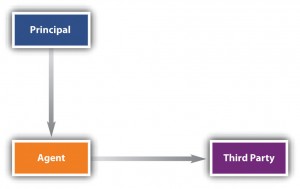In this blog post, Pramit Bhattacharya, a student of Damodaram Sanjivayya National Law University writes about the principle of undisclosed principal in a contract of agency. The post highlights the provisions under the law and also the rules which govern the rights and liabilities of the parties.
The principle of Agency is a special contract in which two parties enter, where one person, known as the agent has the authority to act on the behalf of the other known as the principal. Undisclosed Principal is a concept which falls under the law of agency in contract law.
Undisclosed Principal
Under the law of contracts, the concept of undisclosed principal relates generally to the rights and obligations of the agent when he is working on the behalf of the principal. Under some cases, the agent may not disclose the name of the principal and the fact that, he is working on behalf of someone else. In such a case, the agent will be held personally liable for his action.
In the case of a disclosed principal, the agent does not bear personal liability for his action. The obligations arising out of the act of the agent falls on the principal. An undisclosed principal is a person who uses an agent to enter into negotiations and transactions, without his own identity being revealed. It seems as if the agent is acting on his own. So, if any dispute arises regarding the transaction, negotiations, or contract, the real principal will not be held liable.
In a case where there is an undisclosed principal, but later the identity of the principal comes to the knowledge of the opposite party, then the opposite party may choose to hold the principal liable because he is the one who has a real interest in the transaction.[1]
The relationship could be explained with the help of an example. Suppose, X is the agent of Y, and X contacts Z to enter into a contract with him to sell his goods for the use of Y. But X does not disclose that he is Y’s agent, and it seems to Z that X is acting on his own accord. X keeps the identity of Y a secret. X and Z enter into a contract, for the sale of certain goods at a certain price. The agreement is entered in the name of X. as if he is the principal. If there is any subsequent breach of the contract, Z can hold X personally liable. In case Z had the knowledge that X is only an agent, and knew the identity of Y also, then Z cannot hold Y liable afterward, because he despite knowing the status of the parties, choose to continue with the contract, with X as a principal. But in case Z knew that X is only an agent, but did not know the identity of his principal, and if later discovers the identity of X’s principal, he may choose either to hold X (agent) or Y (principal) liable in the case of a breach.
Provisions under Indian law
An undisclosed principal is a person whose identity is known by the third party. In the eyes of the third party, the agent is the principal. There are some rights and liabilities which are imposed on the undisclosed principal by the law. These rights and liabilities are imposed on him, even when he is not made a party to the contact. The concept of undisclosed principal is an exception to the rule that only a party to the contract can be sued or can sue.[2]
Agent and Undisclosed Principal
The relationship between an undisclosed principal and agent is the same as that of the relationship between a disclosed principal and an agent. In a case where the principal is undisclosed, the agents act as a trustee. Even though the contract is entered into in the name of the agent, he is answerable to the principal. The agent is under an obligation to disclose to the principal about any benefit which has been earned, any payment which has been made, etc.
Third Party and Undisclosed Principal
Two conditions are to be satisfied before the undisclosed principal can enforce any right (or incur any liability, in case the third party subsequently gets to know the identity of the principal and choose to hold him liable)-
- The agent must have an express or implied authority from the principal to enter into a contract with the third party
- The agent enters into the third party not for his own benefit, but for the benefit of the undisclosed principal.
Rules governing rights and liabilities between an undisclosed principal and third party[3]
- Generally, an undisclosed principal can be sued by the third part, or he can sue the third party, except in some exceptional circumstances.
- An undisclosed principal remains liable towards the third party with regards price of services rendered or goods sold under the law of contract, even when it wasentered into in the name of the agent. He wouldn’t be discharged if he has instructed the agent to make payment to the third party and the agent does not make the payment.
- In case, the identity of the principle becomes known to the third party, and any subsequent breach takes place, the third party can choose either to sue the agent or the disclosed principle.
- There are a few cases where the disclosed principle can’t be sued by the third party in case of breach of a contract. There are cases where the identity of the parties is very material to the formation of the contract. For instance-
- A contract which requires personal services or skills cannot be performed by an undisclosed principle. For example, a concert which is to be performed by a singer, or a show which is to be hosted by a host cannot be done by an undisclosed agent, because the third party enters into the contract on the basis of the reputation of the person.
- Where a third party enters into a contract with the agent of the undisclosed principal to lend some money to the agent in the personal capacity, it cannot be enforced by the undisclosed agent.
- Where the agent and the undisclosed principal is aware of the fact that the opposite party will not enter into a contract with the undisclosed principal, the undisclosed principal cannot use an agent to enter into the contract with the third party.
In a case where the principal wants the contract to be performed, he can do so only subject to the rights and the liabilities which subsist between the third party and the agent. In the case where the agent into a contract with a third party without disclosing the name of the principal and the third party is ignorant of the identity of the principal, and enters into the contract believing that the agent himself is the principal, the rights of the third party is protected. This is because he entered into a contract with the agent in good faith without having any idea that some other party is also involved in the contract. Section 232[4] of the Indian Contract Act stats that when the third party enters into a contract with the opposite party, without knowing or suspecting that he is the agent (who is acting on the behalf on an undisclosed principal, and portrays himself as the principal), then if the undisclosed principal wants the contract to be performed, he can enforce the contract only on the basis of the rights and obligation which is existing between the agent and the third party.
For instance, X owes Rs 1000 to Y. X then enters into a contract with Y to sell him goods worth Rs 2000. X enters into the contract on behalf of Z, whose name X does not disclose and enters into the contract as if he himself is the principal. Y has no knowledge about Z’s identity. In such a case Y can set-off the amount that X owes him and Z cannot compel Y to purchase the rice without setting off the amount of the debt.
Section 231 of the Indian Contract Act[5] states that the third party will have same rights against the principal as the party would have had against the agent if the agent were the principal. In a case where the identity of the principal is revealed before the contract has been executed, then the third party may refuse to perform his part of the contract if he can satisfactorily show that if he had known the identity of the principal, he wouldn’t have entered into the contract. Also, when the identity of the principal becomes known, the third party may choose either to sue the principal or the agent. But if the third party chooses any of the parties and fails to recover the damages, he cannot sue the other party subsequently. In the case where the third party is sued by the undisclosed principal or enters into any settlement with the third party, the third party can’t be subsequently sued by the agent. The law recognizes the fact that when the rights of the undisclosed principal are in question, he is at an advantage compared to the third party.
Footnotes:
[1]Violett v. Powell’s Adm’rs, 10 B. Monr. 347
[2]http://www.eaa.org.hk/en-us/Information-Centre/Publications/Agency-Law/-10-Undisclosed-principals
[3]http://www.lawctopus.com/academike/rights-liabilities-undisclosed-principal-agency/
[4]http://www.vakilno1.com/bareacts/indiancontractact/indiancontractact.html#182_8220Agent8221_and_8220principal8221_defined8211
[5]idid
 Serato DJ Crack 2025Serato DJ PRO Crack
Serato DJ Crack 2025Serato DJ PRO Crack












 Allow notifications
Allow notifications


